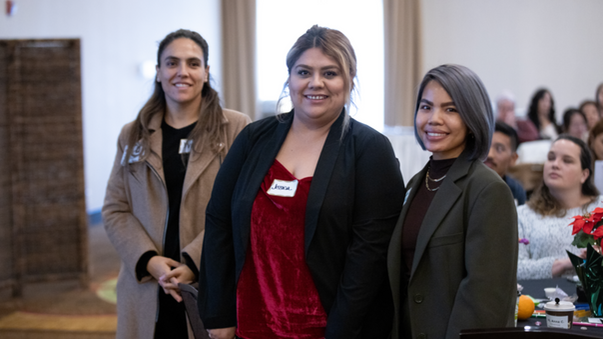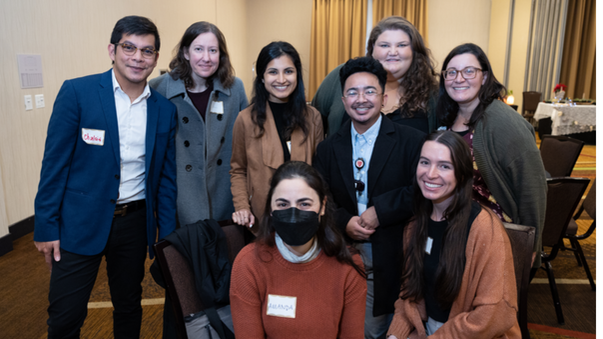.jpg)



Shared Leadership Council (SLC): Organization-wide
Shared Leadership Council
Stanford’s Shared Leadership Council (SLC) model of shared governance supports collaborative decision-making among nursing leadership, frontline clinicians, and interprofessional colleagues on an organization-wide level.
SLC is a decision-making body that collaborates, communicates, & coordinates improvements in the practice environment.

Despite the constraints imposed by the pandemic, SLC continued to thrive, revealing a shared governance that is not only adaptable but also innovative and resilient.
After successfully adopting a fully virtual meeting format for 2+ years in response to the pandemic, SLC made a triumphant transition back to in-person in December 2022.

2022
361
50+
42
Action Request Forms (ARF) were closed in 2022.
Unit Councils and 11+ Ambulatory Service Line Councils collaboratively and productively engaged
SLC/ASLC members received PNDP
promotions
Pathway to 5th Magnet
Redesignation 2025
SLC members demonstrate Stanford’s excellent nursing practice through Vis Walls, constructive collaboration, and a deep understanding of both the Strategic Plan and Stanford Medicine Healthcare’s mission.
Aligning SLC with SHC:
-Maintained an accessible and interactive format to ensure council alignment with the Strategic Plan and Magnet accountabilities
Facilitating Collaboration Across Councils:
Unit and Service Line
Councils worked together to address quality-related issues through the A3 process and developed group presentations based on quality topics.
SLC
Notable
Achievements
Engaging,
Inclusive Discussion:
SLC served as a platform for thoughtful discussion among nursing leaders regrading topics like Workplace Violence, IDHE, and ways to proactively address opportunities from NDNQI results.
SLC Retreat December 2022:
A combined Inpatient and Ambulatory SLC event, represented the first largest in-person meeting in nearly 3 years and 400+ stakeholder representing all levels of leadership.
Magnet Philadelphia 2022,
SHC hosted 70+ nurse leaders at an event with over 11,000 attendees which was the largest gathering of nurses in history.
Martha Wolde, MSN, RNC, AMB-BC
ASLC Ambulatory Care Council Chair
Stanford Gynecology and Uro-Gynecology
"Transformational leadership impacts our commitment and motivation to provide safe, quality care, promote best practices, and increase patient and nurse satisfaction."


Colleen Avery, BSN, RN, BMTCN, CN IV,
Caritas Nurse® Shared Leadership Quality & Informatics Council Chair
E1 Unit: Blood and Marrow Transplantation
"The community that Shared Leadership Council provides has deeply impacted my professional practice and growth. SLC has facilitated connections, collaborations and projects that have positively affected patient and staff experience. As a community we foster engagement and professional development, we lift each other up to accomplish great things and lead the path forward in Nursing Excellence!"
Ragini Mistry, MSN, RN, PCCN
SLC Coordinating Council Chair-Elect
J7 Unit: Cardiovascular, Pulmonary Hypertension & Arrhythmia AAU
“SLC means connecting, creating, and progression. It’s amazing networking in a world-renowned institution that can lead to lifelong friendships. SLC is making change through the eyes of our frontline leaders. I’m honored and humbled to work with SLC members whom I can collaborate with and watch their professional growth. “

SLC is strategically aligned with the Nursing & Patient Care Services Strategic Plan, SHC's Operational Plan, and SHC's Mission, Vision, and Values.

Advanced Practice Providers (APP) Shared Leadership Council
The Advanced Practice Providers (APP) Shared Leadership Council (SLC) is a shared decision-making, advising and coordinating body accountable to promote the collaboration, leadership, and professional growth of APPs. In partnership with the Center for Advanced Practice (CAP), the APP SLC forum facilitates engagement in opportunities related to clinical growth, educational enrichment, quality improvement, and professional role advancement. With the support of CAP and SLC, APPs within the organization ultimately enhance patient care standards and find a better sense of professional fulfillment.
National Advanced Practice Provider Week
In 2022, Stanford Health Care was the host of National APP Week for the 2nd year in a row. In 2021, Stanford Health Care’s Advanced Practice Provider team spearheaded planning for the first National APP Week.
National APP Week Events included:
•Latte Day
•Executive Rounding
•Night Rounding
•APP Awards Ceremony
•Shared Leadership Tabling
•Picnic with Boba and Tacos

Advanced Practice Provider Shared Leadership Council Committees




APP Mentorship Program
All newly hired APPs with less than three years of advance practice experience will be automatically enrolled in the APP Mentorship Program, which is two years long.
The APP Mentorship program is designed to increase APP retention, engagement and job satisfaction. To ensure that all APPs are supported in APP role integration, enculturation and professional development, the program components offer mentorship for APP's with less than 3 years' experience and a component for APPs with greater than 3 years' experience, along with 1:1 coaching for all APPs.



Since inception of the APP mentorship program there have been a total of 403 APPs entered into the program, and 24 active 1:1 peer coaching. Six cohorts, with a total of 49 APPs completed the mentorship program in 2022.
Ambulatory SLC
Ambulatory SLC was officially launched in 2019. Currently, the Ambulatory Shared Leadership Councils consist of 11 Service Line Councils that represent over 500 specialty care and primary care clinics that are strategically aligned and drive numerous patient care improvements.
Wins for 2022
72
11
ACTION Program
Cohort #2
Action Request Forms (ARF) were closed in 2022.
Ambulatory Care Team Improvement and Optimization Program continued
ASLC members promoted to new position, pursuing higher education or received RNC Clinical Ladder
promotions
-
Through the beginning of November, the 11 Service Lines of ASLC have collectively closed a total of 72 ARFs. Since the inception of ASLC in 2019, the Councils have collaborated to on a total of 221 ARFs with an 88% closure rate.
-
There has been a total of 3 PCCs and 2 RNs that have moved on to higher education. Additionally, 3 have been promoted to a new position, and 3 RNs have been promoted on the RNC Clinical Ladder. *
-
Creation of Taskforces
-
The Policy and Procedure Taskforce - created and integrated into the Ambulatory Practice Council. This consists of frontline staff as policy and procedure content experts for their Service Line with the goal of improving visibility and understanding of ambulatory policy and procedure development and revision.
-
PCC Clinical Ladder Taskforce - created for the opportunity of professional development for PCCs that parallels the RNC Clinical Ladder and PNDP
-
Safe Patient Handling Taskforce – due to the work done in the council, CEPD partnered with the SPH program to update SPH policy to include Ambulatory Care, develop an ambulatory specific HealthStream module, and initiated the training of SPH Champions to serve as peer-educators.
-
-
ACTION (Ambulatory Care Team Improvement and Optimization) Program has continued on to Cohort # 2 after the Pilot go-live in 2021, with the goals of standardizing RN and PCC roles and scope of practice and clinic workflow, improving staff engagement and communication, and continued development and expansion of nurse-led visits.

11 Service Line Councils
-
Cancer Care
-
Cardiovascular
-
Solid Organ Transplant
-
Primary Care & Employer-Based Clinics
-
Infusion Treatment Areas
-
Neuroscience
-
Orthopedics
-
Emeryville Specialty & Primary Care
-
Palo Alto Specialty Care
-
Redwood City & Byers Specialty Care
-
Clinical Advice Services
Submitted by: Jodie Mae B. Shiba, BSN, RN, ONC, Nurse Coordinator
Orthopaedic Surgery Joint Clinic
2022 Shared Leadership Council Retreat
"Reigniting the Spark through Reflections, Healing in the Moment, and Looking Forward"
The SLC Retreat 2022 brought organization-wide, multi-level nurses and interprofessional leaders together to reflect on the achievements, adversities, and efforts to continue restoring health while looking optimistically ahead towards a promising 2023. The efforts of shared governance contribute to improve working conditions which enhance quality of care and in turn, increase patient satisfaction rates.












































